- Home
- David Pilling
Medraut Page 16
Medraut Read online
Page 16
“Cerdic has no wish to talk with you,” he sneered. “Why should he? You have nothing to offer, my lady. Not even your flesh. These are Cerdic’s terms, as you call them. He may agree to spare your miserable life, so long as you crawl on all fours through the streets of Caerleon, like a dog, and kiss his foot. Do this, and you might be fortunate enough to spend the rest of your day as the lowest of slaves in his service. Cleaning out the dung of other slaves, made to sleep on the dirtiest straw, whipped and beaten and despised by all.”
He rejoiced at the look of absolute horror in the queen’s eyes. “Of course, Cerdic may choose not to be merciful, and take your head anyway. Fix it to a nail above the door of his mead-hall, or boil away the flesh and use your pretty skull for a drinking vessel.”
Gwenhwyfar visibly fought to keep her composure. “I will do this,” she said at last in a voice that shook. “I will accept all these degradations, if Cerdic agrees to spare the people of Caerleon.”
Medraut snorted. “No bargain, lady. Your people will die or be enslaved. They are dying already.”
He cupped a hand to his ear. “Listen. Can’t you hear their screams?”
Now Cadwy, who had leant heavily on his staff, drew himself up.
“What did Morgana do to you, Medraut?” he asked with sadness in his voice. “How did she corrupt the boy I once knew?”
The mention of Morgana’s name hit Medraut like a blow. He never thought of the woman he had abandoned, the Seer who had guided his steps and forged his destiny. She was deliberately pushed from his thoughts, exiled from his dreams. Medraut refused to be a martyr to guilt.
“Do not speak of her, priest,” he spat. “You know little and understand less. Another word, and I’ll cut you down where you stand.”
Llacheu stepped in front of his brother. Steel flashed in the candlelit gloom as he ripped out his sword.
“You will have to slay me first!” he roared.
Medraut’s patience, his slender self-control, snapped like a thread. With a wordless cry, he lunged at Llacheu. Gwenhwyfar’s cry of dismay melded with the ring of steel as their blades crashed together. The brothers hacked at each other with silent fury. Medraut had occasionally sparred with Llacheu, and as swordsmen they were well-matched: both tall and strong, skilled from a lifetime of practice, with a long reach. But here Medraut was fresh, his brother wearied and bleeding from many wounds. It was soon over. Medraut smashed aside a weak blow to his head and brought his sword up, two-handed, in a scything cut that almost took off the top of Llacheu’s head. The other man fell and landed heavily on the steps, dead before he hit the stonework. His blade clattered to the floor.
Medraut stood frozen. Blood, his brother’s blood, dripped from his raised sword and trickled down his face. A ghastly silence hung over the chamber, broken only by the twitching of Llacheu’s body as he went into his death throes. Cadwy dropped to his knees beside the corpse and threw himself over it.
“Traitor!” he screamed at Medraut. “Murderer! Fratricide! Slay me too – slay the last of your brothers! God’s curse forever on your head! I will see you excommunicated…damned…driven out…”
His voice trailed away into uncontrollable sobs. Medraut slowly regained control of himself. He lowered his sword and turned to the last man blocking his way to the dais. “Llyr,” he whispered, “I know you for a loyal man, sworn to defend Queen Gwenhwyfar to your last breath. Loyalty has no place here. Virtue is useless. Move aside or die.”
Llyr was even more badly wounded than Llacheu. He could barely stand, yet came at Medraut with a spear. Medraut knocked it away and drove the edge of his sword into Llyr’s throat. The faithful bodyguard dropped, choking on his blood. Medraut threw away his sword and marched up the steps. Gwenhwyfar shrank before him. He grasped a fistful of the queen’s yellow hair and punched her in the stomach. She doubled up, gasping. He hurled her onto her back.
“I’m going to spit on you, Gwenhwyfar,” Medraut said in a conversational tone, “just a little bit of phlegm, to remind you of your true place in the world. And mine.” He worked up a gobbet of phlegm and let it drop on the queen’s face. She wiped it away, shuddering.
“Kill me, then,” she gasped. “Make an end. Enjoy yourself while you can. My husband shall avenge me.”
Medraut slowly shook his head. “Oh no, my lady. The honour of killing you belongs to another. Poor wretch. I would not deny him his pleasure.”
He signalled at Amhar. The gigantic mute stood apart from the group of kings, who had watched in silent fascination as Medraut slew two men and threw down a queen. Amhar loped forward, grunting in excitement. His ugly features were contorted with hate, lips peeled back from his teeth in a feral snarl. Gwenhwyfar stared at him in disbelief.
“Amhar… Christ save us…is it you? What have they done to you, my son...my only son…”
“Too late to play the doting mother,” said Medraut, “far too late. Alas.”
He laughed softly and stepped aside. Amhar raced up the steps. The giant stood over his mother and lifted his spear in both hands. Gwenhwyfar screamed.
14.
Artorius’ fleet enjoyed a smooth passage across the Hibernian Sea and disembarked off the north-east coast of Munster. There were no hostile forces gathered on the shingle beaches or the cliffs overlooking the sea. Nothing to oppose his men as they rowed ashore in longboats.
“Our enemies don’t know of your coming, lord king,” said Corc, the Hibernian warrior sent by King Feidlimid to beg for aid.
He smiled, and made the sign of the cross. “I am glad. This means my master still holds out at the Rock. That fortress has endured since it was built. It will endure forever.”
Artorius was less confident. He sent out bands of scouts to hunt for enemy forces inland. Perhaps the Scotti lay in wait, hoping to spring an ambush as the Britons struggled through difficult and unfamiliar country. In the meantime, he pitched camp on the headland, with his fleet anchored just offshore and a strong guard set over the longboats drawn up on the beach. His men were ordered to dig a ditch around the perimeter of the camp. Piles of stakes were unloaded from the ships to erect a temporary stockade. While his soldiers laboured, Artorius summoned Bedwyr to his tent.
“Corc and his men are our only guides in this country,” said the king. “I’ve never set foot in Munster, and don’t trust the Scotti. We may be walking into a trap.”
Bedwyr scratched the grey bristle on his chin. “King Feidlimid owes us much. You made him the most powerful ruler in Hibernia. Sent him horses and weapons in exchange for yearly tribute. He has no reason to betray us.”
“Perhaps I was too generous,” replied Artorius. “After the last war I wanted an ally in this country. A strong man to hold the others in check. I might have done better to let the petty kings of Hibernia fight each other. Supplied them with the means and left them to it.”
He toyed moodily with the plain gold ring on his index finger. “What if Feidlimid has allied with the other Scotti kings? Perhaps Corc was sent to lure me here, so I can be destroyed with all my army. No more tribute levied from Hibernia. No more government from afar.”
Bedwyr shrugged helplessly. “What if angels dance on rainclouds? All we can do is advance with caution and keep our line of retreat open. Or else turn around and sail home.”
Artorius thanked Bedwyr for his advice and dismissed him. The High King was left alone to brood in his tent, listening to the sounds outside. The neigh of horses, jingle of harness, workmen cheerfully cursing the weather and each other as they laboured on the ditch. All the familiar noises of an army on campaign. Rain pattered gently against the canvas walls of his tent.
I can only advance, he thought. I need to win a victory before handing power to Llacheu. The failure of the Quest undermined my authority. Made me look vulnerable. Flawed. My son must inherit a strong and peaceful kingdom, not one divided by uncertainty and foreign wars.
His scouts returned before nightfall with little to report. They had ventured as
far as they dared into the forests, and seen nothing more dangerous than the occasional wolf or stag. Artorius took small comfort from this: the Scotti were masters of concealment and sudden ambushes. The country along his line of march to Caiseal might contain any number of hidden warbands. Artorius accepted the risk.
At dawn the next day, he broke camp and marched south-east into the wilderness, leaving a rearguard of a hundred auxiliaries to guard the beachhead. Corc offered to take his warriors on ahead as scouts.
“Your men can go,” said Artorius, “but you stay with me. Tell me more about the defences at Caiseal, and the quality of our enemies.”
“As you wish, lord king,” replied Corc, though with ill grace. Artorius’ meaning was clear: he wanted to keep the man as a hostage. There was little more he could learn of the Rock of Caiseal, or the enemy. Corc had told him everything he knew during the voyage over the Hibernian Sea.
The army pushed on. There were no roads, since the Romans had never established a foothold in Hibernia and the natives relied on ancient trackways known only to themselves. Artorius’ instinct was to move as fast as possible. This strategy had served him well in the past, but in the bogs and misted forests of Hibernia it could lead to disaster. He chafed at the slow pace as his cavalry picked their way through the deep woods, followed by struggling columns of infantry.
Bedwyr sensed his master’s impatience. “Rein yourself in, old man,” he murmured with a knowing wink, “lest you do yourself an injury.”
Artorius grinned. Only Bedwyr could be so familiar with him. It was good to have at least one man he could talk with as a friend. The two had known each other since childhood, had shared in every war and adventure for over forty years.
He glanced affectionately at the stooped and grizzled figure riding at his side.
What will become of you, old friend, when I retire to my monastery? Llacheu will want new men to serve him. I shall have to find some comfortable berth for you. A handsome young wife, if you want one, and rich estates. Somewhere you can grow fat and old, surrounded by children.
Bedwyr, unaware of his king’s searching look, slapped a fly away from his neck. Their horses splashed hock-deep through yet another muddy bog, part of an apparently endless expanse of bleak marshland, dotted here and there with clumps of trees and reedbeds. It hadn’t stopped raining since they arrived in Hibernia. A bleak grey sky lowered overhead, yet the air was uncomfortably warm.
“Damn these insects,” he growled, “damn this rain, damn this heat. Damn the rebels that brought us to this God-cursed island. My rheumatics are playing up. All the old wounds. Every ache and pain and scar on my body. Oh to be young again, and anywhere but Hibernia!”
Artorius laughed. “Careful. Once this war is over, I may decide to appoint you governor of Hibernia. Leave you here to keep the natives in line. Would you like that? A roundfort all of your own, with Scotti slaves to serve you, and some local chieftain’s daughter to warm your bed at night.”
Bedwyr grimaced at the prospect. His long face, sallow and deeply lined, crumpled like an old sack.
“Don’t jest, Artorius,” he moaned, “you lack the gift for it. Every word from your lips sounds like an order.”
“The legacy of command,” Artorius replied.
Yes, he thought sadly, I have worn this power for too long. Time to shed it, while something remains of my true self.
Mercifully, they soon left the marshlands behind and delved into an easier landscape of meadows, fringed by misted hills. To the north was a small lake surrounded by woodland. A wisp of smoke rose into the trees from the pointed roof of a crannog or roundhouse of thatch and timber, raised out on the lake on a wooden platform. Artorius was familiar with these crannogs from his last campaign in Hibernia. The roundhouse was connected to the mainland via a plank bridge. If danger threatened, the bridge was collapsed or burnt.
“Never mind it,” said Corc. “Whether friendly or hostile, the crannog will only contain a handful of spears. No threat, no threat at all.”
He pointed to the west.
“The Rock of Caiseal lies just three miles yonder. Our enemies sleep like babes, lord king. They have sent out no scouts of their own, no outriders, no men to block our path.”
Artorius remained cautious. He kept his troops at a steady pace until Corc’s scouts came racing out of the mist on their shaggy ponies.
“The Rock holds!” their leader shouted excitedly. “The hosts of Laigin and Osraige crowd about it, yelping like dogs, and are whipped back every time! Even now the fight rages, a pitiful thing to see. The fury and the slaughter, the great men cast down, the numberless slain!”
Artorius could restrain himself no longer.
“On!” he shouted, signalling to his trumpeter. “Cavalry, with me! Bedwyr, bring the footmen up as soon as you may.”
The Companions went forward at the gallop, supported by the mounted auxiliaries. Artorius tore ahead of them all on Llamrei. He outstripped even the Scotti on their light ponies, bred for moving at speed across the difficult country of Hibernia.
Llamrei carried him up the flank of the western hills. Sunlight broke through the curtain of mist and presented Artorius with a view of the Rock of Caiseal. He caught his breath. The immense craggy plateau of the Rock of Caiseal dominated the landscape below. It was crowned by a fort, a roughly circular wall of stones heaped above an earthen rampart. Beyond the wall rose the gabled roof of a longhouse or mead-hall. A shudder ran through him. The place reminded Artorius of Alt Clut, the great hill-fort in the far northeast of Britannia, where he had spent his miserable childhood as a slave. The Rock was under siege, surrounded on all sides by an ocean of tents. Hundreds of tiny figures, like ants, swarmed up the southern flank of the plateau. Scotti bowmen loosed their flaming arrows high over the wall, to plunge down inside. Smoke funnelled into the sky from burning outbuildings. The defenders fought back fiercely, raining stones and javelins down on the heads of their enemies.
Corc galloped up to join Artorius.
“See,” he panted, “it is as I said. All the thieves of Hibernia have gathered here.”
He jabbed his spear at the standards waving above the distant throng.
“Laigin and Osraige, Mide, Ulaid, the northern Uí Néill. Bréifne and the men of Airgialla. A mighty hosting, gods rot their blackened souls.”
“And a distracted one,” said Artorius. He quickly measured the distance between himself and the Rock. Half a mile or thereabouts. So far as he could see, the camp was lightly guarded. The rebel Scotti kings had thrown all their forces, perhaps two thousand men, into the assault on the Rock.
Hoofbeats drummed on the hillside as the Companions raced to join their master. Artorius twisted in the saddle to watch them. These were his best men, hardened veterans from the old days, sprinkled with a few promising youths. The huge form of Peredur, now the captain of his own troop, loomed above all others.
Artorius raised Caledfwlch above his head. Sunlight flashed down the whorled blade. Some eternal spirit dwelled inside the sword, once wielded by Julius Caesar himself. With Caledfwlch in his hand, Artorius knew he was invincible. “Charge!” roared the High King. The horsemen thundered down the slope, led by the golden figure on a black horse. Behind him the dragon banner unfurled in the wind, stretched and snapped like a living beast, jaws open wide. The drumming of hoofs and the blowing of horns ripped through the skies; a storm swept in from the sea, a herald of death to those gathered on the plain.
Men scattered in panic as the Companions swept in among the tents, spearing and hacking, leaping over the supper fires and crude shelters. Artorius galloped straight as an arrow towards the Scotti host raging under the walls of the Rock. He swerved left, burst headlong across a stretch of open ground and plunged into the nearest band of Scotti bowmen. They broke up and scattered before him like frightened deer, wailing in panic. Artorius rode them down, struck right and left. Llamrei surged on through the terrified mob of skirmishers and into the main body of the en
emy host.
For a moment Artorius was alone, surrounded by a press of bodies. Then his Companions charged home. All was swirling chaos, riders hurling spears or cutting with their long swords at the heads and bodies of Scotti footmen. The enemy ranks were shattered by the impact of the charge, screams and braying horns sounded the alarm – too late, much too late. The Scotti fought, and died, and vanished under the churning hoofs. Their courage broke, and within seconds their host had dissolved into fragments. They fled, howling in terror, and were pursued and cut down without mercy.
Artorius unleashed his riders, let them have free rein to chase down the enemy at will. He meant to break the rebellion, here, under the walls of the Rock, and leave Hibernia with dreadful memories of his cruelty. The fugitives, those survivors of the broken host who managed to crawl back to their homes, would carry tales of this slaughter to every corner of the island. After today the Scotti would not rise again in Artorius’ lifetime, or that of his son and successor.
The men inside the Rock were quick to seize the advantage. A horn sounded on the heights, and the timber gates of the roundfort swung open to disgorge a troop of mounted spearmen on ponies. These men galloped full tilt down the path winding round the slopes of the fort to join the massacre on the plain. They split up and gave chase, shouting for joy as they butchered their fleeing enemies, like so many wolves among sheep.
Soon Bedwyr arrived at the head of the infantry. They came streaming over the hills to the east and descended on the enemy camp. Now the enemy were routed, Artorius’ soldiers were free to plunder at will. Bedwyr left his men rifling through the tents for valuables and rode to join his master.
“An easy victory,” he cried, laughing, “and not a single man lost. Perhaps I could grow to love Hibernia after all!”
Artorius was distracted by the approach of Feidlimid, King of Munster. The scarred old warlord, well into his fifties, was the only one of his troop to wear a coat of ring-mail. His brow was adorned with a slender band of red gold, and his coat had no sleeves, exposing long white arms covered in tattoos.

 The Growth Delusion
The Growth Delusion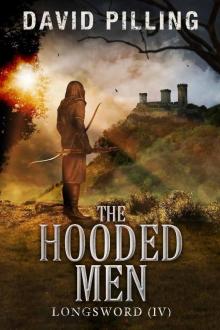 The Hooded Men
The Hooded Men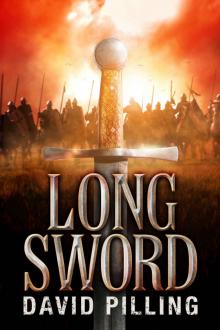 Longsword
Longsword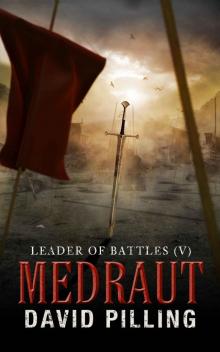 Medraut
Medraut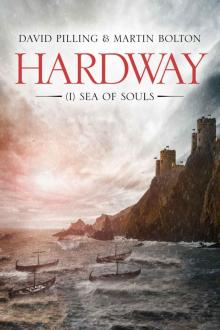 Hardway
Hardway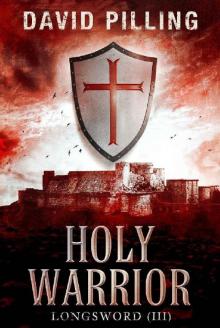 Holy Warrior
Holy Warrior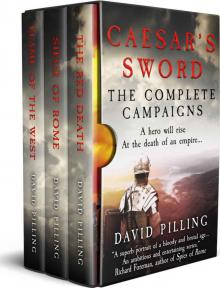 Caesar's Sword: The Complete Campaigns
Caesar's Sword: The Complete Campaigns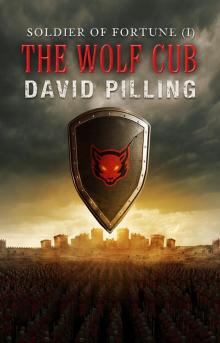 The Wolf Cub
The Wolf Cub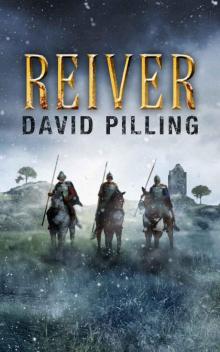 Reiver
Reiver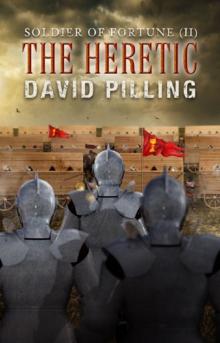 The Heretic
The Heretic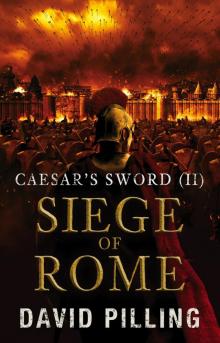 Siege of Rome
Siege of Rome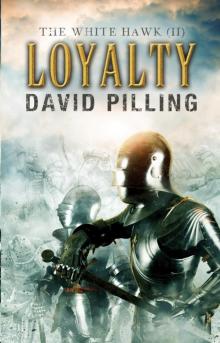 Loyalty
Loyalty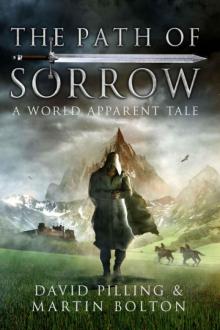 The Path of Sorrow
The Path of Sorrow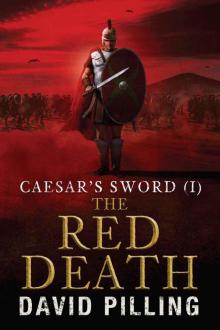 Caesar's Sword (I): The Red Death
Caesar's Sword (I): The Red Death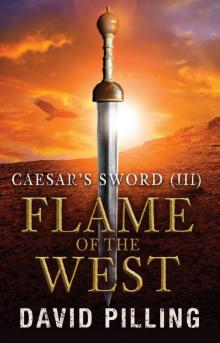 Flame of the West
Flame of the West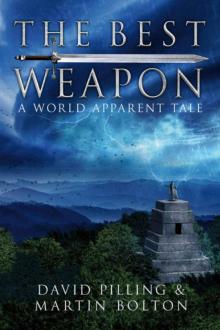 The Best Weapon
The Best Weapon Sacrifice
Sacrifice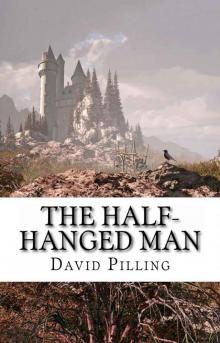 The Half-Hanged Man
The Half-Hanged Man